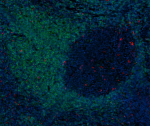- Clone
- QA20B07 (See other available formats)
- Regulatory Status
- RUO
- Other Names
- Macrosialin
- Isotype
- Mouse IgG1, κ
- Ave. Rating
- Submit a Review
- Product Citations
- publications

-

Human paraffin-embedded tonsil tissue slices were prepared with a standard protocol of deparaffination and rehydration. Antigen retrieval was done with Citrate buffer 1X pH 6.0 at 95°C for 40 minutes. Tissue was washed with PBS/ 0.05% Tween-20 twice for five minutes, blocked with 5% FBS and 0.2% gelatin for 30 minutes and permeabilized with 0.5% Triton X-100. Then, the tissue was stained with 10 µg/mL of purified anti-human CD68 recombinant (clone QA20B07) and purified anti-human IgD (clone W18340A) at 4°C overnight. On the next day, the tissue was washed twice with PBS and stained with Alexa Fluor™ 594 goat anti-mouse IgG (clone Poly4053) (red) and Alexa Fluor™ 647 goat anti-rat IgG (clone Poly4054) (green) for two hours at room temperature. The nuclei were counter staining with DAPI (blue). The image was scanned with a 10X objective and stitched with software.
| Cat # | Size | Price | Quantity Check Availability | Save | ||
|---|---|---|---|---|---|---|
| 381202 | 100 µg | 90€ | ||||
CD68, also known as macrosialin, is a 110 kD glycoprotein which belongs to the sialomucin family. It is closely related to the family of acidic, highly glycosylated lysosomal-associated membrane proteins (LAMPs). CD68 is predominately expressed in cytoplasmic granules of monocytes/macrophages, dendritic cells, and granulocytes. It is one of the useful myeloid cell markers. Further studies have shown that CD68 is also expressed by a subset of hematopoietic progenitors, γ/δ T cells, NK cells, LAK cells, subset of B cells, fibroblasts, and endothelial cells. The biological function of CD68 is still unknown.
Product DetailsProduct Details
- Verified Reactivity
- Human
- Antibody Type
- Recombinant
- Host Species
- Mouse
- Formulation
- Phosphate-buffered solution, pH 7.2, containing 0.09% sodium azide
- Preparation
- The antibody was purified by affinity chromatography.
- Concentration
- 0.5 mg/mL
- Storage & Handling
- The antibody solution should be stored undiluted between 2°C and 8°C.
- Application
-
IHC-P - Quality tested
IHC-F, IP - Reported in the literature, not verified in house - Recommended Usage
-
Each lot of this antibody is quality control tested by formalin-fixed paraffin-embedded immunohistochemical staining. For immunohistochemistry, a concentration range of 5 - 10 µg/mL is suggested. It is recommended that the reagent be titrated for optimal performance for each application.
- RRID
-
AB_2922613 (BioLegend Cat. No. 381202)
Antigen Details
- Structure
- Sialomucin family, 110 kD
- Distribution
-
Monocytes/macrophages, dendritic cells, granulocytes, subset of hematopoietic progenitors, γ/δ T cells, NK cells, LAK cells, subset of B cells, fibroblasts, endothelial cells
- Molecular Family
- CD Molecules
- Antigen References
-
- Holness CL and Simmons DL. 1993. Blood. 81:1607-13.
- Gottfried E, et al. 2008. Scand J Immunol. 67:453-63.
- Hameed A, et al. 1994. Hum Pathol. 25:872-6.
- Gene ID
- 968 View all products for this Gene ID
- UniProt
- View information about CD68 on UniProt.org
Related Pages & Pathways
Pages
Related FAQs
Other Formats
View All CD68 Reagents Request Custom Conjugation| Description | Clone | Applications |
|---|---|---|
| Purified anti-human CD68 Recombinant Antibody | QA20B07 | IHC-P |
| Alexa Fluor® 647 anti-human CD68 Recombinant Antibody | QA20B07 | IHC-P |
Compare Data Across All Formats
This data display is provided for general comparisons between formats.
Your actual data may vary due to variations in samples, target cells, instruments and their settings, staining conditions, and other factors.
If you need assistance with selecting the best format contact our expert technical support team.
-
Purified anti-human CD68 Recombinant Antibody

Human paraffin-embedded tonsil tissue slices were prepared w... -
Alexa Fluor® 647 anti-human CD68 Recombinant Antibody

Human paraffin-embedded tonsil tissue slices were prepared w... 
Human paraffin-embedded prostate tissue slices were prepared...
 Login / Register
Login / Register 








Follow Us